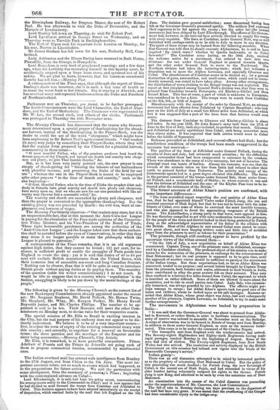The Morning Chronicle has discovered that the reason why Government
determined upon a special prayer of thanksgiving for the abund ant harvest, instead of the; thanksgiving in the Prayer-Book, was the desire to avoid the use of the word "cheapness," which might have been unpleasing to Sir Robert Peel's agricultural friends. "Our readers (it says) may judge by consulting their Prayer-Books, where they will find the regular form prepared by the Church for a plentiful harvest, commencing in these terms
" 0 most merciful Father, who of thy gracious goodness hart heard the devout prayers of thy Church, and turned our dearth and scarcity into cheapness and plenty, we give Thee humble thanks," &c.
But, as it has been very justly pointed out, the new prayer is one simply of thanksgiving for "blessing the labours of our husbandmen with plentiful increase, and preserving the fruits of the field for our use "; whereas the one in the Prayer-Book is meant to be employed after other prayers "in the time of dearth and scarcity," such as the one beginning
" 0 God, Merciful Father, who in the time of Elisha the prophet didst suddenly in Samaria turn great scarcity and dearth into plenty and cheapness, have mercy upon us, that we who are now for our sins punished with like adversity may likewise find a seasonable relief," &c.
The scarcity and dearth are succeeded by plenty and cheapness, and then the prayer is converted to the appropriate thanksgiving. But the existing plenty was not preceded by dearth : the evil was, want of employment and lowness of wages. The Morning Post bitterly observes—" Our readers may stare, but it is an unquestionable fact, that at this moment the Anti-Corn-law League is paying for the circulation of the Free-trade opinions of the Conserva tive Prime Minister, and his Vice-President of the Board of Trade. These right honourable gentlemen are among the authorities of the 'Anti-Corn-law League ' ; and the League takes care that these authorities shall be paraded before the eyes of Conservatives, in order that they may deem it no longer possible to resist the philosophy which the League is pleased to patronize." A correspondent of the Times remarks, that it is an old argument against high duties, that they cannot be levied ; 12+ per cent, for in stance, is sufficient profit to enable the smuggler of Paris goods into England to evade the duty : yet it is said that duties of 40 to 80 per cent will exclude British manufactures from the United States, with their immense line of accessible sea-coast and long Canadian frontier. "Nothing can be clearer, than that it will be quite as easy to introduce British goods without paying duties as by paying them. The morality of the question (adds the writer conscientiously) I do not touch. It would be idle to suppose that in a country where 'repudiation' is the fashion, smuggling is likely to be put down by the moral feelings of the people."


























 Previous page
Previous page